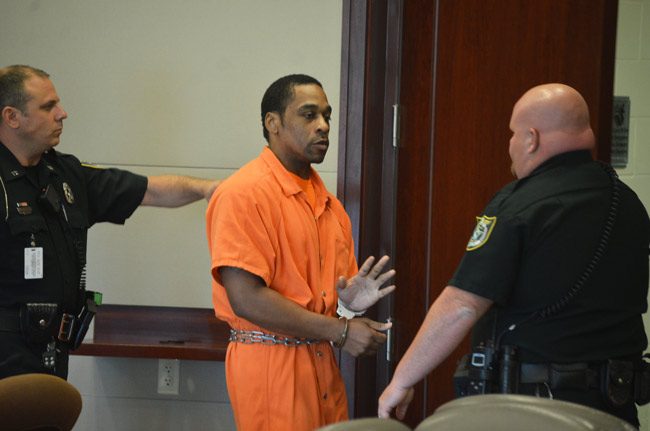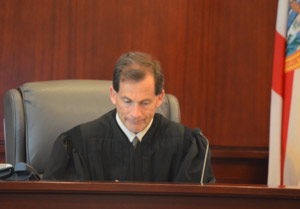
Denying defense motions to overturn a jury’s guilty verdict and acquit, Circuit Judge Dennis Craig this morning sentenced James Taylor, 39, to life in prison without parole. He wasn’t yet done pronouncing the sentence before one of Taylor’s attorneys walked toward a clerk with the document signaling her office’s intent to appeal, underscoring the extent to which the defense feels Taylor’s trial was unfair and the sentence untenable.
A jury in April found Taylor guilty of lewd and lascivious molestation when he entered his then-11-year-old step-daughter’s bedroom at night and for “a couple of seconds,” in her words, touched or brushed the upper area of her chest, over her clothes.
Based on the jury’s verdict, Taylor’s criminal past, and his status as a prison re-offender who was in prison or on parole less than three years before the latest offense, the judge had no choice but to impose the mandatory maximum sentence. Taylor has prior convictions for rape and was already a sex offender based on two convictions on lewd and lascivious charges, one in 2000 and one in 2005, both involving adolescents. Today he was branded a sexual predator, though the designation is moot should he spend the rest of his life in prison.
Today’s sentence was expected, but the two-hour hearing was no less shorn of dramatics for several reasons: A motion for a new trial was largely a rehearsal for Public Defender Steve Gosney’s appeal, as Gosney went through the four arguments he will be making to the 5th Circuit Court of Appeal shortly. Gosney who, like his co-counsel on the case, Regina Nunnally, can be quite dramatic, argued that Taylor was convicted on flimsy evidence of an act hundreds of thousands of parents commit every night when they simply check on their child being in bed and breathing, as Gosney said he himself does with his young son. He at one point called the prosecution “ignorant” of the law, but not malicious in its conduct. The judge did not admonish him but did not agree with the characterization.
The hearing resulted in an extended and unresolved debate over the meaning of “breast,” “chest” and “chest area,” because the case hinged on the child’s recollection of the night, when she was 11, when Taylor touched her, where and why. Despite a clerk printing a definition of the word “breast” from dictionary.com, the debate was never resolved, with the judge relying instead on the jury’s conclusion that it was sufficient to know that the breast area of the child was targeted, though that blurred line between “breast” and “chest,” or between a mere pat and a sex act, is very much part of Gosney’s appeal since the line itself delineates the difference between an innocent act and life in prison.

Taylor had been step-father to three young girls, two of them his eventual accusers. Priscilla Taylor said she would always love the three children despite the outcome of the trial. “My love will never change,” she said. “The truth will reveal itself.” (The defense has said that much in his record is not accurate, too, but the record is long and revealing of successive violent acts. Priscilla Taylor referred to one such alleged untruth in a letter to Craig).
Assistant State Prosecutor Joe LeDonne, who had tried the case, maintained his cool throughout: he is not the theatrical type and his rhetorical tactics hew strictly to the letter of the law—and, in this case, to witnesses’ testimonies and the jury verdict. He showed little patience for the debate over the meaning of “breast,” and he barely bothered answering the four points Gosney raised in his move for acquittal. LeDonne asked for the maximum sentence, and he got it.
The jury had been admonished not to look at media accounts during trial, or do independent research into Taylor’s past, or have conversations about it with anyone. But in a three-day trial in the Internet age, it is impossible to know whether jurors follow those instructions or not, since they are free to go home at the end of each trial day, smart phone in hand. Trail lawyers don’t always put credence in jurors’ claims that they avoid all exposure to material related to the case they’re hearing.
But while some cases’ appeal look like lost causes, this one does not, particularly since Craig himself gave the defense a significant opening: Taylor’s verdict was based not on the definition of “breast,” but on his “intent” at the moment he touched the girl for those couple of seconds. But that intent was established only when the girl’s older sister was allowed to testify to an allegation on which Taylor was neither tried nor convicted: that he raped her. The defense had succeeded in keeping all of Taylor’s criminal history out of the trial. But it had failed to keep that girl’s testimony out of it, too. Once the girl testified to the alleged rape, the prosecution could then more credibly establish intent behind Taylor’s touching the younger girl.
Gosney is arguing in his appeal that the second girl’s testimony should never have been allowed, as it prejudiced his client and criminalized an innocent act.
Craig agreed: Certainly the prejudice was there. “Whether it was unfair or not is the real question,” he said in a remarkable moment of candor that will not likely go unnoticed once transcripts are printed and conveyed to appellate judges. The defense argued that it was not. The judge ruled that it was. But the jury based its verdict on the evidence being allowed. (The jury was never made aware that Taylor would face life in prison if found guilty. For all jurors knew, they could have thought he’d get five years, or even probation.)
Craig went on: “It’s very clear that one of the main defenses is that this was a mistake, this was just a parent doing something and it was in the dark,” but, the judge said, the notion of it being misconstrued as a sexual act was “rebutted by the similar fact evidence,” meaning the older girl’s allegation of rape. “It went to the heart of the defense as to whether this was a mistake or not,” Craig said, denying the defense’s motion for a new trial.
In other words the judge was openly conceding that absent the second girl’s testimony, Taylor’s act that night with the younger girl may well have been perceived as an innocent act. Craig subsequently conceded as well that “the court isn’t so sure of itself that I didn’t make a mistake in maybe one ruling on the golden rule argument or not,” during the prosecution’s closing when the defense objected several times on various grounds but the judge defined each objection. The golden rule is when a lawyer tells the jury to place itself in the shoes of the defendant, or in the shoes of the victim: lawyers are not permitted to do so. The defense feels the prosecution violated that rule. The judge never upheld those objections. Nevertheless, even if he’d made those mistakes, Craig said, the mistakes “certainly didn’t rise to the level of this case being an unfair trial for Mr. Taylor.”
So he denied the motion for a judgment of acquittal as well. Then he moved on to the sentencing phase. All the while, the children’s mother was in the first row of the courtroom, her hands firmly held by those of a victim’s advocate. From time to time the victim’s mother would show exasperation with Gosney’s arguments, especially when he claimed that Taylor’s act was no different from that of innumerable parents every night.
Taylor himself was a lot more subdued than he had been during the trial days in April. Back then, when he was allowed to appear in court unshackled, wearing civilian clothes, he’d worn dashing suits and ties. Today he was in the regulation orange prison garb, his hands and feet shackled, his demeanor resigned. In April he’d spoken a couple of times to his parents, defying bailiffs. This time, he merely waved at them once as he was being led out after his sentencing and fingerprinting.
Taylor will be sent to the state prison system, where he will await the appeal. It could be about six months before the appeal court hears the case.





























George says
““Don’t cry James because I’m crying,” she told her son before speaking of the Taylors as a Christian family, and of her son’s record showing him to be a bad man. “But he’s really not,” she said. “We know it’s not true, and the good thing about it, the god lord knows it’s untrue.” To her son, she said: “Stay strong, you know you did the right thing.””
“Taylor has prior convictions for rape and was already a sex offender based on two convictions on lewd and lascivious charges, one in 2000 and one in 2005, both involving adolescents.”
How can “The god lord know it’s untrue,” if he’s already been convicted multiple times of rape? Do you think the rape victims care what excuses people make in God’s name? Locking him up for life won’t take back what he did, but it will stop him from doing it again.
r&r says
There might be a Judge who listened to the people and put this peace crap away for life.
Alphonso Zeimers says
Wow, that seems like a long time. I wonder if a lie detector test would have mitigated the conviction if in his favor?
Sw says
Dear as long as you and he believe it its ok I Dont bye bye
anonymous says
I can assure you that having been a member of this jury no one did any private investigating on their own. This unanimous decision was the result of intense discussion where all members came to an agreement.
Benjamin Bartlett says
I’ve seen fire and I’ve seen rain.
I’ve seen sunny days that I thought would never end.
I’ve seen lonely times when I could not find a friend,
But I always thought that I’d see you again.
Fire and Rain
–James Taylor (Not the man in cuffs)